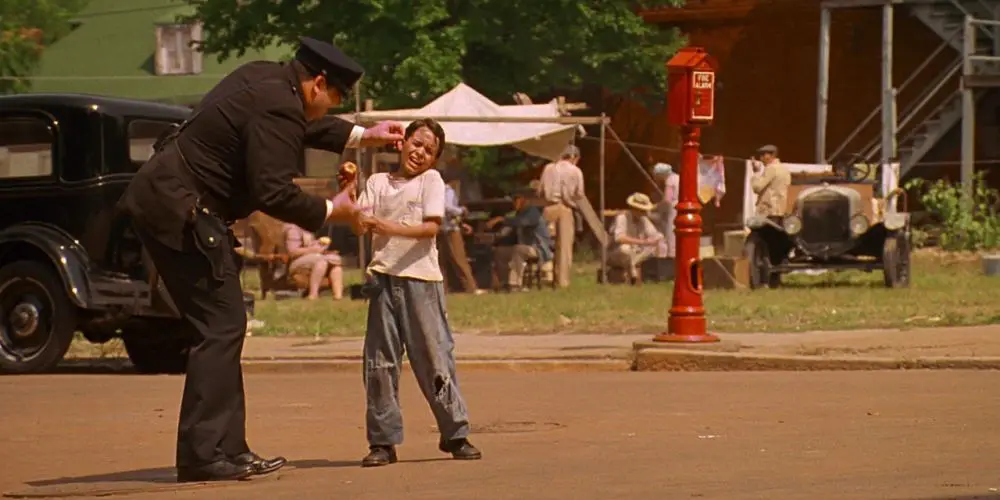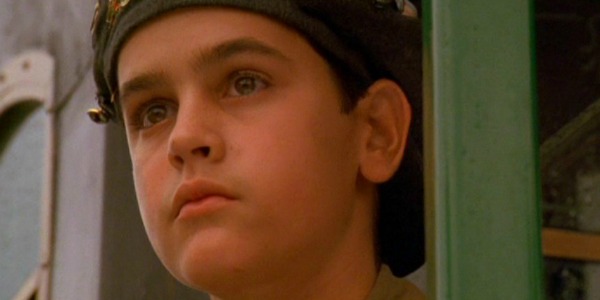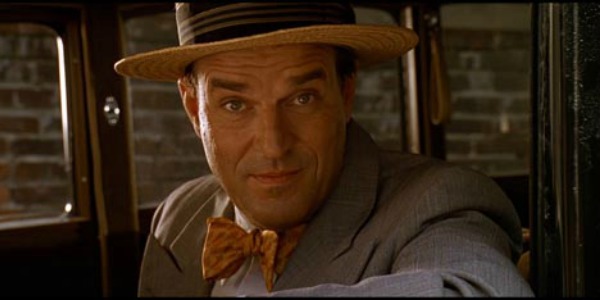Forgotten Gem: Steven Soderbergh’s KING OF THE HILL

Blogger (www.theconflictedfilmsnob.com), freelance writer and movie lover ever since watching…
Back in 1993, Steven Soderbergh just came off the disappointment that was his ambitious yet unloved second feature, Kafka. He turned his attention to a property best described as a sure-thing, a money grab, if you will; writer A. E. Hotchner’s despairing, yet uplifting, childhood memoir “King of the Hill”. Of course I jest.
If Soderbergh’s eclectic filmography has shown us anything, it’s that he’s more dedicated to maturing as an artist than tallying big numbers at the box office. Well, excepting his Ocean’s trilogy. Instead of helming something with solid commercial prospects, he followed his muse – this small, coming-of-age tale set in sultry, depression-era St. Louis – risking his ever-dwindling stash of goodwill, accrued from his 1989 breakthrough, sex, lies and videotape.
Alas, King of the Hill bombed, this despite being lauded by the critics. Luckily for him (and us), it was a relatively low-budget production ($8MM) and thus didn’t end Soderbergh’s directorial career. It went on to survive three more financial disappointments (The Underneath, Gray’s Anatomy and Schizopolis), before finally gaining popular traction with 1998’s Out of Sight.
Sadly, the further we get from its 1993 release, the more King of the Hill fades from view, buried beneath Soderbergh’s vast, high-quality output, a footnote in his prodigious filmography. Let’s try to remedy this.
Synopsis
King of the Hill tells the story of Aaron Kurlander (Jesse Bradford), an 8th-grader we first meet delivering a speech to a classroom full of bored peers (including a young Katherine Heigl). His subject? Explorer Charles Lindbergh.
However, instead of telling a straight tale of Lindbergh’s transatlantic heroics, Aaron inserts himself into the proceedings (“I knew I could count on you, Aaron; I’ll cable you from Paris!”), much to the delight of his teacher, Miss Mathey (Karen Allen). Via this short glimpse we, the audience, recognize that the kid is full of gumption, wit and creativity, personality traits that should serve him well in a town crippled by the Great Depression.

After school, Aaron meets up with his little brother, Sullivan (Cameron Boyd), and the two make their way home to the rundown Empire Hotel. Here, the four Kurlanders live in a single room. They are, to quote one of Aaron’s more fortunate classmates, among “the poor, unfortunates” so prevalent in St. Louis back in 1933.
On their way to their room, they witness a neighbor, a painter named Mr. Sandoz, evicted by the hotel’s management muscle, bellhop Ben. However, this shocking development is superseded by what Aaron’s parents (Jeroen Krabbé and Lisa Eichhorn) have to tell the boys: Sullivan is to be shipped to a relative’s home somewhere outside of St. Louis until the Kurlanders can get back on their feet financially.
It seems Mr. Kurlander, who futilely hawks wick-less candles door-to-door, is expecting to land a more lucrative job selling Hamilton watches. Ultimately, he hopes to score a WPA gig so they can move to the relatively upmarket Carleton Court apartments “where we belong.”
Things do not improve after Sullivan’s departure. Aaron’s mother, suffering from consumption (the first inklings of which are deftly handled by Soderbergh in an earlier scene) is forced into a sanatorium. Soon thereafter, Mr. Kurlander needs to hit the road, too, the result of the Hamilton watch job coming through.
Apparently, his sales territory is to be Iowa, Kansas and Oklahoma, everywhere but his home state of Missouri (“Oh, I didn’t get the territory I asked for. But you know, beggars can’t be choosers!”). Thus, the 14-year-old Aaron suddenly finds himself parentless and expected to fend for himself with only 25 cents for spending money and no feel for when his father will return.

“Listen to me, Aaron,” Mr. Kurlander says, shaking his son’s hand goodbye before driving away.
“You’re going to be okay, huh? You’re a smart boy. I tell you how smart you are. Once, when you were less than a year old, your mother was in the sanitarium with consumption, and you would cry every night. So, the first few times, I picked you up and you stopped crying. So, I realized you just wanted attention. The next time you cried, I got a glass of cold water, and I stood over the crib and I said, ‘You see this? This is a glass of cold water. So, you better stop crying or you’ll be sorry.’ But you kept crying, so I poured the water in your face and you stopped crying! From then on…when you cried, all I had to do was to show you the glass of water and you’d stop crying. Now, that’s a smart baby for you, eh? You be a mensch.”
No doubt harsh, especially to modern ears, but certainly in line with those desperate times, not to mention Mr. Kurlander’s stoic Germanic upbringing. Still, anyone reading this who identifies as a “helicopter parent” might consider taking a Valium the “size of a hockey puck” (to quote 1984’s Broadway Danny Rose) to calm themselves. Because it only gets worse for Aaron.
Left to his own devices, Aaron, on the brink of starvation and eviction, roams the hotel, He interacts with a menagerie of characters, including hustler and friend Lester (Adrien Brody), a gum-popping elevator operator (Lauryn Hill…yes, that Lauryn Hill), the eccentric Mr. Mungo (the late Spalding Gray), and his mysterious roommate, Lydia, played by Elizabeth “Lady Grantham” McGovern and, most poignantly, Ella McShane (Amber Benson), a young epileptic girl down the hall who’s sweet on him.
A Closer Look
Make no mistake, King of the Hill can be a tough sit. Despite some uplift at the very end, Aaron’s post-family life is a living hell, his abject poverty ultimately taking both a physical and emotional toll. We, the audience, can’t but help feel emotionally drained witnessing each new travail. After all, what could be more resonant that watching a child in extremis, even one as resourceful and mature beyond his years as Aaron?
But that’s not to say that Soderbergh manipulates us with treacle. No, that’s not in his DNA. Rather, he presents the audience with situations, both good and bad, and lets them play without directorial button pushing.
And so, in addition to such heart-wrenching scenes as Aaron cutting illustrations of food from a magazine to eat for dinner, his ill-fated dance with the fragile Ella, and the glimpse of Mr. Sandoz looking defeated in a Hooverville, we’re also treated to grace notes such as the elevator operator gifting Aaron with a pack of gum to celebrate his 8th-grade graduation, Aaron spending a hard-earned 50 cents to buy Ella a kitten, and Aaron and Sullivan exacting sweet revenge on bellhop Ben.

Soderbergh himself has an interesting relationship with King of the Hill. In a interview conducted by The Criterion Collection for its 2013 release of the film on Blu-ray, he notes,
“…it’s one of those films that other people seem to think of more fondly than I do…in terms of the result. I don’t think it’s a failure…[but] I look at it now and the stylistic choices I’m not happy with. I think it’s too beautiful. And that’s sort of on me. I mean, Elliot Davis…is a very gifted D.P. and I got very much what I was asking for at the time and it’s a beautiful film to look at. I just think in retrospect that was kind of the wrong approach [and] that the film should’ve had a much rougher, grittier feel to it.”
He goes on to note that, despite his lukewarm critique of its “look” 20 years on, King of the Hill was a necessary step in his development. “Filmmakers now don’t get to make the mistakes that I made. I needed those mistakes. I feel bad—everyone’s expected now to emerge just full-blown right out the gate. I needed those early movies to figure out what I was up to.”
Soderbergh’s Experiments
One can see how Soderbergh, not a film school guy, used his first three films to learn and perfect his craft. sex, lies and videotape is a tour de force in film editing, which he handled himself. In Kafka, he was able to experiment with black-and-white noir photography and shadowing. In King of the Hill, he tried his hand at a 2.39:1 ‘scope aspect ratio, widescreen framing he’d experiment with even more creatively in his next feature, The Underneath, which he shot using anamorphic lenses.
[easy-tweet tweet=”One can see how Soderbergh, not a film school guy, used his first 3 films to perfect his craft.” user=”FilmInquiry” usehashtags=”no” template=”light”]All of this, of course, informs the filmmaker he is today. One not afraid to switch between aspect ratios depending on the project, one who experiments with colors and filters to evoke a certain place or mood. Moreover, one so proficient in the technical aspects of filmmaking that, in addition to directing (and sometimes writing), he acts as his own cinematographer (as Peter Andrews) and editor (as Mary Ann Bernard).
Despite Soderbergh’s misgivings about certain aesthetic choices (misgivings I don’t share, I think his burnished, Edward-Hopper scheme does wonders to create a believable mise-en-scène), King of the Hill remains a wonderful film. It’s beautifully written, scored and acted, technically assured, and so evocative of a specific time and place. A lesser director might spend an entire career trying to make something as adroit, only to fall short of the elusive brass ring. The prodigiously talented Soderbergh accomplished it at the tender age of 30.
Have you seen King of the Hill? If yes, where do you think it falls in terms of Soderbergh’s overall filmography?
Does content like this matter to you?
Become a Member and support film journalism. Unlock access to all of Film Inquiry`s great articles. Join a community of like-minded readers who are passionate about cinema - get access to our private members Network, give back to independent filmmakers, and more.
Blogger (www.theconflictedfilmsnob.com), freelance writer and movie lover ever since watching David Hartman fly in a dirigible in 1974's "The Island at the Top of the World" at the local General Cinema (whose corporate bumper to this day raises the hair on the back of my neck). Eclectic movie tastes, as comfortable sitting through "Kingpin" (the Amish bowling one) as Welles' "The Magnificent Ambersons." Fascinated by the more technical aspects of movie production and presentation. Full head of hair, very few greys.













